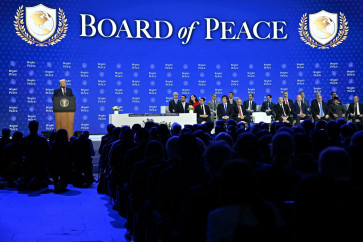Popular Reads
Top Results
Can't find what you're looking for?
View all search resultsPopular Reads
Top Results
Can't find what you're looking for?
View all search resultsRI can play more decisive role in South China Sea conflict: Experts
Outward looking: Speakers at the Conference on Indonesian Foreign Policy 2015 held by the Foreign Policy Community of Indonesia, (from left to right) former ambassador Dino Patti Djalal, Markplus founder Hermawan Kartajaya, Foreign Minister Retno LP Marsudi, Bandung Mayor Ridwan Kamil, Centre for Strategic and International Studies co-founder Jusuf Wanandi, Makassar Mayor Mohammad Ramdhan Pomanto and Stanford Universityâs lecturer Donald K
Change text size
Gift Premium Articles
to Anyone
 Outward looking: Speakers at the Conference on Indonesian Foreign Policy 2015 held by the Foreign Policy Community of Indonesia, (from left to right) former ambassador Dino Patti Djalal, Markplus founder Hermawan Kartajaya, Foreign Minister Retno LP Marsudi, Bandung Mayor Ridwan Kamil, Centre for Strategic and International Studies co-founder Jusuf Wanandi, Makassar Mayor Mohammad Ramdhan Pomanto and Stanford Universityâs lecturer Donald K. Emmerson, pose for a photograph during the opening ceremony in Jakarta on Saturday.(JP/Awo) (from left to right) former ambassador Dino Patti Djalal, Markplus founder Hermawan Kartajaya, Foreign Minister Retno LP Marsudi, Bandung Mayor Ridwan Kamil, Centre for Strategic and International Studies co-founder Jusuf Wanandi, Makassar Mayor Mohammad Ramdhan Pomanto and Stanford Universityâs lecturer Donald K. Emmerson, pose for a photograph during the opening ceremony in Jakarta on Saturday.(JP/Awo)
Outward looking: Speakers at the Conference on Indonesian Foreign Policy 2015 held by the Foreign Policy Community of Indonesia, (from left to right) former ambassador Dino Patti Djalal, Markplus founder Hermawan Kartajaya, Foreign Minister Retno LP Marsudi, Bandung Mayor Ridwan Kamil, Centre for Strategic and International Studies co-founder Jusuf Wanandi, Makassar Mayor Mohammad Ramdhan Pomanto and Stanford Universityâs lecturer Donald K. Emmerson, pose for a photograph during the opening ceremony in Jakarta on Saturday.(JP/Awo) (from left to right) former ambassador Dino Patti Djalal, Markplus founder Hermawan Kartajaya, Foreign Minister Retno LP Marsudi, Bandung Mayor Ridwan Kamil, Centre for Strategic and International Studies co-founder Jusuf Wanandi, Makassar Mayor Mohammad Ramdhan Pomanto and Stanford Universityâs lecturer Donald K. Emmerson, pose for a photograph during the opening ceremony in Jakarta on Saturday.(JP/Awo)
O
span class="caption">Outward looking: Speakers at the Conference on Indonesian Foreign Policy 2015 held by the Foreign Policy Community of Indonesia, (from left to right) former ambassador Dino Patti Djalal, Markplus founder Hermawan Kartajaya, Foreign Minister Retno LP Marsudi, Bandung Mayor Ridwan Kamil, Centre for Strategic and International Studies co-founder Jusuf Wanandi, Makassar Mayor Mohammad Ramdhan Pomanto and Stanford University's lecturer Donald K. Emmerson, pose for a photograph during the opening ceremony in Jakarta on Saturday.(JP/Awo)
The 10-member ASEAN has held numerous summits during which leaders have repeatedly discussed regional security issues. However, it seems that they have made little progress toward resolving the problems they vowed they would resolve.
Centre for Strategic and International Studies (CSIS) co-founder Jusuf Wanandi said that each ASEAN country had its own approach to the problem but that bureaucracy was holding them back.
'The East Asian Summit, for example, should be a platform for resolution, but ASEAN has yet to make full use of it. It should be the main architect of regional security,' Jusuf said at the 2015 Conference on Indonesian Foreign Policy (CIFP) on Saturday.
According to Jusuf, finding resolutions to the problems can be done with the help of Chinese think tanks collaborating with ASEAN think tanks, including those in Indonesia, to help find collaborative solutions to the South China Sea dispute or any other problems between China and ASEAN.
Speakers at the conference suggested that Indonesia should use its relatively warm relationship with China to help forge significant solutions to the South China Sea dispute. Indonesia could also help establish better relations between ASEAN and the People's Republic of China.
The experts and analysts presumed that as the largest country and largest economy in ASEAN, Indonesia would have a significant advantage in helping to mediate and resolve regional disputes with China.
Indonesia does not have a direct claim to any of the disputed areas in the South China Sea, therefore making it relatively free of any heated conflict with China compared to other ASEAN countries, such as the Philippines, Vietnam, Malaysia and Brunei. The four countries, China and Taiwan have overlapping claims over the South China Sea, where China claims nearly all parts of the territory.
The Jakarta Post chief editor Meidyatama Suryodiningrat said that being geographically the ASEAN country farthest from China, Indonesia benefited from having no proximity paranoia against the territorially aggressive country, which also resulted in China approaching matters with Indonesia differently than it would with other ASEAN countries.
'Indonesia is an objective player in regards to the ASEAN and China disputes. If China loses Indonesia's support, it will lose the support of ASEAN,' he said.
Southeast Asia expert Donald K. Emmerson mentioned that Indonesia should realize its role as a dynamic middle power, and not limit its foreign policy to accommodate China's relative superpower status.
Critical of ASEAN, Emmerson noted that if the union did not aim higher than the notion of 'peace' for the South China Sea dispute, or any other disputes with China for that matter, the union would remain internally divided and weak.
'This won't happen unless ASEAN aims to resolve its disputes through more than just consensual agreements on peace,' Emmerson noted.
The Stanford University professor urged Indonesia not to wait for an official ASEAN code of conduct on the South China Sea dispute to materialize and instead be proactive and explore alternative ways to resolve the matter.
Building upon Emmerson's comments, Chinese Ambassador to Indonesia Xie Feng questioned ASEAN's commitment to agreeing upon the declaration of a code of conduct on the issue.
'If something that has been agreed upon by China and other ASEAN states cannot be implemented, how can we be sure the next deal would be implemented as well? However, China is willing to help speed up the process of concluding a code of conduct on this matter,' the Chinese ambassador said.









